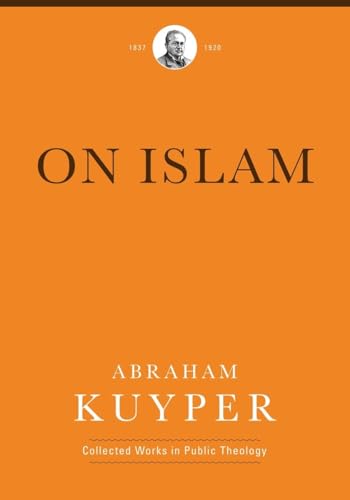Dutch polymath Abraham Kuyper is a giant in Reformed Protestant theology. He served as a pastor, politician, Prime Minister of the Netherlands, publisher, journalist and author. He founded a newspaper, a political party, and a university. The Abraham Kuyper Translation Society has made his collected works available in English, including On Islam, which recounts his tour around the Mediterranean (August 1905–June 1906). This volume spans a range of Kuyper’s interests. He makes observations about diverse topics, including education, economics, international relations, religion and theology, and spiritual trends in global politics. Nevertheless, the pebble in Kuyper’s shoe is the Muslim Umma and Islam.
What Kuyper writes about the future, including his repeated prophecies (and warnings), is particularly intriguing. In some instances, he was prescient. One example is his prediction that China will rise to greatness, throw off European shackles, with Japan leading the way: “Once awakened, China can develop a tremendous power that will overcome any resistance… great treasures lie hidden in this giant empire” (p. 5). Kuyper says this, not to cause anxiety, but “only to prevent surprise over this outcome” (p. 6). Even today, surprise over the rise and rise of China is not yet exhausted.
Another prophecy concerns the potency of what Kuyper calls the Pan-Islamic movement: the Islamic Awakening seeking to unite the Umma, restoring the glory and political dominance of Islam by establishing a caliphate. He warns that colonial regimes will have to contend with this movement in the not too distant future. Although he sees Islam politically as a spent force—“as a political force, Islam is no more” —yet he emphasizes its great spiritually potency. He says, “Islam remains in a strong position … and Europe will have to reckon with it” (p. 215). In contrast to some of his contemporaries, Kuyper rightly discerned that Islam’s spiritual power would not easily dissipate, and the peoples of Islam even then were making preparations to rise again.
Some of Kuyper’s predictions fall wide of the mark. He anticipates the conversion of virtually all of Africa to Islam, with no success for Christian missions. Instead, Christianity is today the dominant faith in the Sub-Sahara.
Perhaps influenced by Romanticism, Kuyper has a mystical understanding of the spiritual character of nations and races. He tends to stereotype groups. For example, everything from Japan to the Middle East is for him “the East” and shares in the “Asian spirit,” in contrast to the “European spirit” (p. 28). He also waxes lyrical about “Semitic spirituality” (p. 38) and “the Semitic conception of life” (p. 175). Admittedly, there are some admirable features in the way he uses these tropes. For example, Kuyper laments the “Germanic Jesus” (p. 307) that infused Protestantism at the time, a tendency in German biblical scholarship to erase the Jewishness of Christianity. Countering this anti-Semitic trend, Kuyper sees the marrying of the Semitic and Aryan spirits in Christianity as a good thing. On the other hand, his tendency to seize on racial traits everywhere he turns can lead to mistakes. Kuyper often confuses linguistic identity with genetic inheritance. His linking of “Semitic” languages with “Shem” of Genesis (p. 302) is one example.
Kuyper’s presentation of Islam is mainly sympathetic, although it is a “warts-and-all” approach. He even hopes that Islam, which he in many respects admires, will unite with Christianity to defeat paganism.
Kuyper’s emphasis on Semitic identity causes him to consider it self-evident that Islam, Christianity, and Judaism are all children of Abraham, an association which deeply influences his approach to Islam.
When reading On Islam, one should keep in mind that Kuyper is a widely-read generalist, not a specialist in every topic he covers. As a result, he makes basic mistakes. For example, although concerned about Islam’s treatment of women, he is under the impression that divorce is readily available for all in Islam. In fact, for women, divorce can be very difficult to secure if the husband opposes it.
A moving aspect of Kuyper’s travelogue is his observation of vibrant Christian communities across Asia Minor and the Levant: two million Christians in Asia Minor alone, mainly Greek Orthodox and Armenian. He discusses the genocide of Christians in Damascus in 1860 and massacres of Armenians in the 1890s. Kuyper describes the obvious fear of Christians he met on his journeys. The prospect of being “overrun by bloodthirsty fanaticism from all sides” (p. 50) was soon to be realized in the Armenian, Greek, and Assyria genocides, reprised by Christian losses in Syria and Iraq of the past 20 years. Many of the vibrant Christian communities Kuyper encountered have disappeared or are a shadow of what he witnessed. In this sense, On Islam can be read as an elegy for a lost world.
A persistent theme of On Islam is Kuyper’s perplexity about the success of Islam at the expense of Christianity. This troubles and challenges him no end. His explanation for why Christian nations turned to Islam is that humiliation under the dhimma was harder to bear than persecution. At the same time, Kuyper is pessimistic about the prospect of Muslims converting to Christianity. He laments that most missions to Muslim societies end up working only with pre-existing Christian populations.
Kuyper’s sense of hopelessness has not been vindicated by history. Today we live in a period when more Muslims are turning to Christ than ever before. It is also an irony that the very thing Kuyper feared as a force for conversion, the Pan-Islam movement, has been instrumental in paving the way for Christian mission in the 21st century. Muslims often have turned to Christ most readily where revival movements have secured political power, such as in Algeria or Iran, and utopian promises have come to nothing.
The editors have supplied this volume with many excellent footnotes, which adds to one’s pleasure in reading. There is a glitch, however, when Kuyper’s understanding of the Islamic jihad is corrected by a note pointing to the concept of the non-violent “greater jihad.” In reality, the tradition upon which the “greater jihad” concept is based is not considered reliable by mainstream Muslim scholars. None of the six Sunni canonical collections of hadith include it. In all pre-modern Islamic jurisprudence, the word jihād refers to military efforts, so Kuyper’s description of this doctrine is consistent with all schools of Islamic law.
Mark Durie
Mark Durie
Melbourne School of Theology
Melbourne, Victoria, Australia
Other Articles in this Issue
In appreciation for the recent resurgence of interest in biblical theology and typological interpretation, this article considers Jonathan Edwards’s typological interpretive practices and principles...
The Insights and Shortcomings of Kantian Ethics: Signposts Signaling the Truthfulness of Christian Ethics
by Zachary BreitenbachImmanuel Kant proposed what he considered to be the one true ethical system—a system rooted in pure reason, without recourse to grounding morality in God, that sought to explain universal moral truth...
The Doctrine of Scripture and Biblical Contextualization: Inspiration, Authority, Inerrancy, and the Canon
by Jackson WuThis essay explores the relationship between contextualization and an evangelical doctrine of the Bible, with a special emphasis on biblical inspiration, biblical authority, biblical inerrancy, and the biblical canon...
Can We Hasten the Parousia? An Examination of Matt 24:14 and Its Implications for Missional Practice
by C. J. MooreAmong the many possible motivations for mission participation, the eschatological motivation for missions has recently grown in prevalence...
“Striving for Glory with God”: Humility as the Good Life in Basil of Caesarea’s Homily 20
by Coleman M. FordBasil of Caesarea (c. AD 330–379) presents humility as the essence of the good life in his Homily 20...







